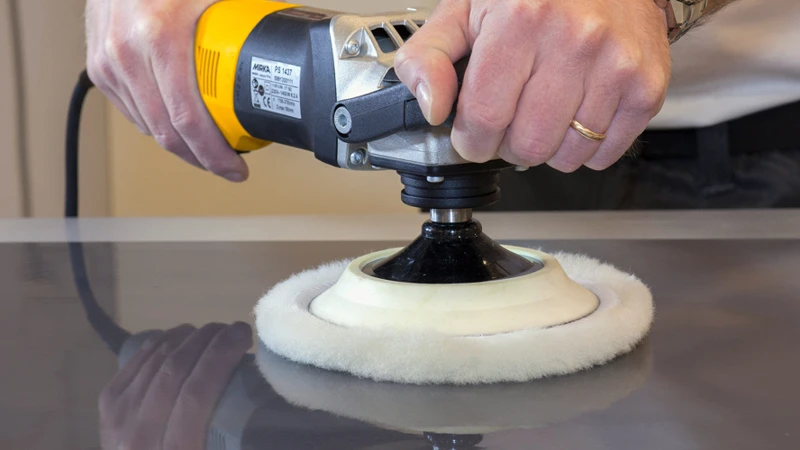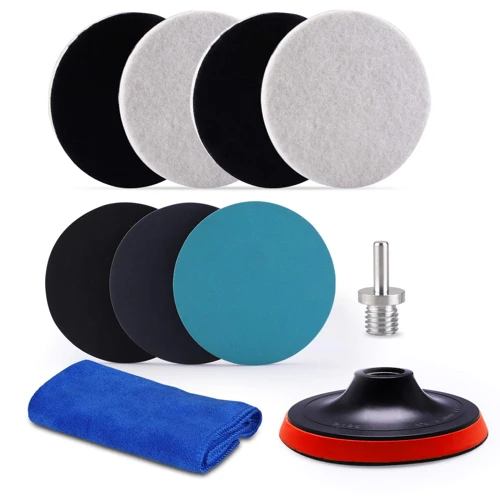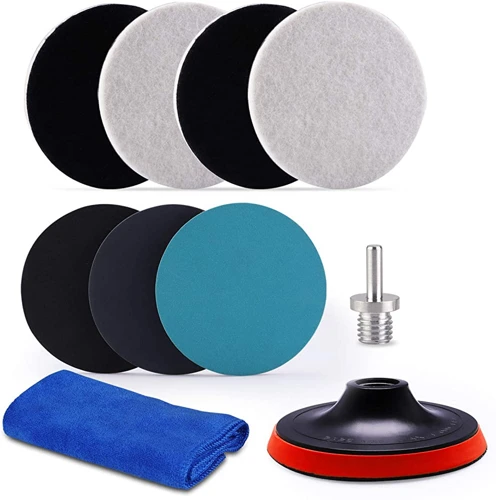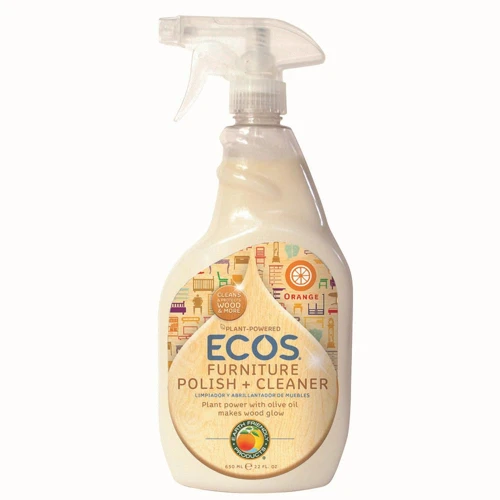As we strive towards a sustainable and eco-friendly lifestyle, it’s important to extend our efforts towards keeping our homes sparkly clean without causing harm to the environment. With the abundance of commercial cleaning products that come with harmful chemicals and toxins, it can be overwhelming to find alternatives that are gentle yet effective. Luckily, there are various eco-friendly polishing tools that are readily available and easy to use. In this article, we’ll explore some of the best eco-friendly polishing tools to keep your wooden, glass, metal, granite, and marble surfaces looking shiny and new.
Wooden Surfaces

Maintaining wooden surfaces is essential in keeping any home looking its best. However, many standard cleaning products can be harmful to the environment and even strip the wood of its natural oils over time. That’s why it’s important to consider using eco-friendly polishing tools. Not only are they better for the planet, but they can also help preserve the integrity of the wood. Let’s take a look at some of the best options available. And if you want to learn more about the benefits of eco-friendly polishing tools, check out this article.
Bamboo Cloths
Bamboo cloths are a sustainable and eco-friendly alternative to traditional cleaning cloths. Bamboo is a fast-growing plant, which means it can be sustainably harvested without damaging the environment. Bamboo cloths are also biodegradable, so they won’t contribute to landfill waste.
In addition to being sustainable, bamboo cloths are also effective at cleaning wooden surfaces. They are soft and gentle, so they won’t scratch the wood. They also absorb moisture well, making them great for cleaning up spills.
To use bamboo cloths for polishing wooden surfaces, simply dampen the cloth with water and wring it out well. Then, use the cloth to gently clean the surface, wiping in the direction of the wood grain. For tough spots, mix a small amount of dish soap with water and use the cloth to scrub the area.
Bamboo cloths are a fantastic option for eco-conscious homeowners who want to keep their homes clean and shiny. They are easy to use, effective, and environmentally friendly. Consider incorporating bamboo cloths into your cleaning routine to help reduce your impact on the planet.
Carnauba Wax
Carnauba wax is a natural wax collected from the leaves of the carnauba palm tree that grows in Brazil. This wax is known for its durability and glossy finish, and is commonly used in eco-friendly polishing products. Here are the steps to polishing wooden surfaces with Carnauba wax:
- Clean the surface: Before starting the polishing process, clean the wooden surface with a soft cloth or brush to remove any dirt or debris that may scratch it.
- Buff the wax: Take a small amount of Carnauba wax and apply it on the wooden surface using a cloth or sponge. Rub it in circular motions until the surface is covered with an even layer of wax.
- Let it dry: Leave the wax to dry for a few minutes until you notice it haze over.
- Polish: Use a clean microfiber cloth to polish the wooden surface. Rub it with back-and-forth motions until the yellowish haze disappears and you are left with a shiny finish.
Using Carnauba wax for polishing wooden surfaces is an excellent eco-friendly option, as it is a natural product that doesn’t contain any harmful chemicals that could be damaging to the environment or pose a risk to your health. Using natural products for cleaning can help reduce your carbon footprint and protect the planet.
Lemon Juice and Olive Oil
Using natural and eco-friendly ingredients to polish wooden furniture is a great way to reduce environmental impact and exposure to harsh chemicals in traditional polishes. A mixture of lemon juice and olive oil is a perfect example of such an eco-friendly option. Here are the steps to using this mixture for polishing wooden surfaces:
- Mix equal parts lemon juice and olive oil in a small bowl.
- Dip a soft, clean cloth into the mixture, making sure to wring out any excess liquid.
- Gently wipe the cloth over the surface of the wooden furniture, applying a thin layer of the mixture as you go.
- Allow the mixture to sit on the surface for 5-10 minutes.
- Using a clean cloth, buff the surface in circular motions to remove any excess mixture and leave a natural, polished sheen.
Not only is using lemon juice and olive oil an effective and eco-friendly option for polishing wooden surfaces, but it also leaves behind a pleasant citrus scent. By using this method, you’ll be helping to reduce the environmental impact of traditional polish products while keeping your furniture looking shiny and new.
Glass Surfaces

When it comes to keeping glass surfaces sparkling, many people turn to harsh chemicals that can be harmful to the environment and human health. However, there are several eco-friendly alternatives that are just as effective, if not more so. By using these all-natural polishing tools, you can avoid contributing to pollution and help protect our planet. Let’s take a closer look at some of the best eco-friendly cleaning solutions for glass surfaces.
Microfiber Cloths
Microfiber cloths are a must-have tool for eco-friendly polishing in any household. These soft and gentle cloths are made from tiny fibers that pick up dirt and dust easily without the need for harsh chemicals. In fact, using microfiber cloths can reduce the amount of cleaning solution needed by up to 90%!
Here are some benefits of using microfiber cloths in your cleaning routine:
- They are eco-friendly as they reduce the use of harmful cleaning chemicals, which can be detrimental to the environment and hazardous to your health.
- They are reusable and can be washed and dried easily, reducing the waste generated from cleaning supplies.
- They are durable and can last for several years, making them a cost-effective option in the long run.
- They are versatile and can be used to clean multiple surfaces, including glass, wood, metal, and granite, making them a multi-functional tool in your cleaning kit.
However, it is important to note that not all microfiber cloths are created equal, and it is important to choose high-quality cloths made from finer fibers to ensure optimal cleaning results.
If you’re looking to incorporate more eco-friendly cleaning tools into your home, microfiber cloths are an excellent choice. They are readily available in stores or online, and you can even make your own by repurposing old clothing materials. Additionally, using microfiber cloths can have a significant positive impact on the environment, reducing waste and the use of harmful chemicals. So, make the switch to microfiber cloths today and enjoy a cleaner, safer, and more eco-friendly home.
To learn more about other eco-friendly polishing tool options, check out our top 5 recommended eco-polishing tools.
Vinegar Solution
When it comes to cleaning glass surfaces, vinegar solution is one of the most effective and eco-friendly options. Vinegar is a natural disinfectant and cleaner, making it a great alternative to harsh chemicals that can harm both the environment and our bodies. Here’s how to make your own vinegar solution for cleaning glass surfaces:
- Mix equal parts white vinegar and water in a spray bottle.
- Shake the bottle well to ensure the ingredients are thoroughly mixed.
- Spray the solution onto the glass surface, being careful not to saturate it.
- Use a microfiber cloth to wipe the solution off the glass in a circular motion.
- If there are any stubborn spots or streaks, spray the solution directly onto the spot and let it sit for a few minutes before wiping it away.
It’s important to note that vinegar is acidic, so it may not be the best option for all surfaces. For example, it could damage natural stone surfaces such as marble or granite. In this case, a pH-neutral solution may be a better choice. Additionally, while vinegar is eco-friendly, it’s still important to properly dispose of the solution once you’re finished using it. Pouring it down the drain can harm aquatic life and local water sources.
Using vinegar solution for cleaning glass surfaces is a great way to maintain a sparkling home while preserving the environment.
Newspaper or Coffee Filters
When it comes to cleaning glass surfaces, such as windows or mirrors, there are a variety of eco-friendly options available. One such option is using newspaper or coffee filters in place of paper towels. Not only do both options provide a streak-free finish, but they can also be composted or recycled afterward.
To use newspaper, simply crumple a sheet into a ball and use it to wipe down the glass surface. For coffee filters, dampen the filter slightly with water and use in the same way as the newspaper. Additionally, microfiber cloths are a great alternative to both paper towels and newspaper, as they can be washed and reused several times.
Using eco-friendly polishing tools not only helps to reduce waste, but it also decreases the use of harmful chemicals that can be found in non-eco polish tools, which can have negative impacts on both human health and the environment. By using these simple and sustainable tools, you can maintain a sparkling home without compromising on environmental ethics.
If you’re interested in making your own eco-friendly polishing tools at home, or want to learn more about the future eco-friendly polishing tools trends and innovations, be sure to check out our other articles for more information.
Metal Surfaces

When it comes to metal surfaces, many people think of harsh chemicals and disposable scrubbing pads. However, there are eco-friendly options that can provide the same sparkling results without harming the environment. By utilizing a few simple tools and ingredients, you can keep your metal surfaces looking like new while also protecting the planet. Let’s explore some of these sustainable options below. For more ideas on eco-friendly polishing tools, you can check out how to make your own at home, or learn about the damaging impact of non-eco alternatives. If you’re interested in how to extend the lifespan of your eco-friendly tools, or even how to use them to clean up after your furry friends, be sure to check out our other articles. And if you want to stay up to date with the latest innovations in sustainable cleaning tools, we’ve got you covered there too.
Baking Soda Paste
To clean metal surfaces, instead of using chemical-laden polishes, you can make your own eco-friendly polishing solution using baking soda paste. Baking soda is a mild abrasive that can remove stains, grime, and tarnish from metal surfaces without damaging them.
To make baking soda paste, combine baking soda with water until a thick paste forms. Apply the paste to the metal surface and use a microfiber cloth to gently scrub in a circular motion. Rinse the surface with water and dry with a clean microfiber cloth.
Not only is this method effective for removing tarnish and grime from metal surfaces, but baking soda is also a natural deodorizer, so it can help get rid of any unpleasant odors on the surface. Additionally, using a homemade baking soda paste is an eco-friendly alternative to chemical cleaners, which can be harmful to both human health and the environment.
If you’re looking for more eco-friendly polishing tools and methods, check out our article on eco-friendly polishing tools or our article on eco-friendly pet polishing tools.
Microfiber Cloths
Microfiber cloths are an eco-friendly option for polishing a variety of surfaces in your home. Made of tiny, densely packed fibers, these cloths are effective at picking up dust, dirt, and grime without the need for harsh chemicals. Here are some of the benefits of using microfiber cloths:
- Durable: Microfiber cloths can be washed and reused multiple times, making them a cost-effective option. Plus, they hold up well over time without losing their effectiveness.
- Non-abrasive: Unlike some polishing tools, microfiber cloths are gentle on delicate surfaces and won’t scratch or damage them.
- Effective: Because of their unique design, microfiber cloths are able to trap dirt and dust particles rather than just pushing them around the surface. Plus, they can be used dry or dampened with water for added cleaning power.
Whether you’re cleaning windows, mirrors, stainless steel appliances, or granite countertops, microfiber cloths are an excellent choice for eco-friendly polishing. Just be sure to wash them regularly to keep them in top condition.
Beeswax
One of the best eco-friendly ways to polish metal surfaces is by using beeswax. Beeswax is not only a safe option for the environment, but it is also gentle on the metal surface. Here are the steps to use beeswax as a polishing tool:
- Clean the surface: Before using beeswax, it is essential to clean the metal with warm soapy water to get rid of any dirt, grime or residue.
- Melt the beeswax: To apply the beeswax, you will need to melt it first. You can do this by using a double boiler system. Simply take a bowl of beeswax and place it over a pot of simmering water. Once melted, remove from heat and let it cool down.
- Apply the beeswax: Once the beeswax is cooled down to room temperature, take a soft cloth, and dip it into the melted beeswax. Apply it generously onto the metal surface.
- Buff the surface: Now, take a clean cloth and start buffing the surface until it shines. Make sure you remove any excess beeswax to prevent any build-up.
Using beeswax to polish your metal surfaces is an effective and affordable way to keep them looking shiny and new. Plus, the natural properties of beeswax provide an additional layer of protection to the metal. Remember to always use a microfiber cloth, and a small amount of beeswax goes a long way.
Granite and Marble Surfaces
Maintaining the pristine appearance of luxurious stone surfaces can be a perplexing task as they are prone to scratches, stains, and dullness. However, with the right eco-friendly polishing tools, you can restore and maintain the natural beauty of these surfaces without harming the environment. In this section, we will explore some effective and sustainable ways to clean and polish granite and marble surfaces with the help of microfiber cloths, natural solutions, and some simple yet powerful ingredients. Let’s dive in!
Microfiber Cloths
One of the most versatile and eco-friendly polishing tools for cleaning various surfaces are microfiber cloths. These cloths are made up of ultra-fine fibers that are tightly woven, making them super absorbent and effective at trapping dirt and grime. Here are some ways to use microfiber cloths for different surfaces in your home:
- Wooden surfaces: Use a dry microfiber cloth to dust and buff wooden surfaces, or dampen it slightly to wipe away smudges and stains.
- Glass surfaces: Microfiber cloths are perfect for cleaning glass surfaces as they don’t leave any streaks. Simply spray a vinegar solution on the surface and wipe it down with a dry microfiber cloth.
- Metal surfaces: Use a slightly dampened microfiber cloth to wipe down metal surfaces and buff them with a dry one. Microfiber cloths are gentle enough that they won’t leave any scratches on your metal surfaces.
- Granite and marble surfaces: Microfiber cloths are a good choice for cleaning these delicate surfaces as they won’t scratch them. Use them with either a dish soap and water solution or a baking soda and water solution.
Microfiber cloths are a great eco-friendly alternative to traditional cleaning materials. They are reusable, durable, and safe for almost any surface in your home.
Dish Soap and Water Solution
When it comes to polishing granite and marble surfaces, dish soap and water solution is a simple yet effective option. To begin, gather the necessary materials:
| Materials | Instructions |
|---|---|
| Dish soap | Choose a mild, eco-friendly dish soap. |
| Water | Lukewarm water is best. |
| Microfiber cloths | These are gentle on surfaces and won’t scratch. |
Once you have your materials ready, follow these steps:
- Prepare the solution: Mix a small amount of dish soap with warm water in a spray bottle or basin.
- Apply the solution: Spray or apply the solution onto the granite or marble surface.
- Scrub the surface: Use a clean microfiber cloth to gently scrub the surface in circular motions.
- Rinse: Rinse the cloth with clean water and wring it out. Use it to wipe the surface, removing the soap residue.
- Dry the surface: Use another clean microfiber cloth to dry the surface thoroughly, preventing water spots or streaks.
It’s important to avoid using acidic or abrasive cleaners on granite or marble as they can cause etching or damage to the surface. Stick to gentle options like dish soap and water. And, using microfiber cloths will help prevent scratches and leave a streak-free shine.
Baking Soda and Water Solution
One effective and eco-friendly way to clean granite and marble surfaces is by using a baking soda and water solution. This solution is a gentle but powerful cleaner that can remove grime, dirt, and stains on these surfaces without causing any damage.
To make the solution, you will need a few simple ingredients which are likely already in your kitchen. Here’s how to do it:
| Ingredients | Steps |
|---|---|
| Baking Soda | 1. In a bowl, mix 1/4 cup of baking soda with enough water to make a paste. |
| Water | 2. Stir the baking soda and water together until the mixture forms a paste-like consistency. |
Once you’ve made the baking soda and water solution, you can use it to clean your granite or marble surfaces in several easy steps:
| Cleaning Steps: |
|---|
| Step 1: Start by wiping the surface clean with a microfiber cloth to remove any loose dirt or dust. |
| Step 2: Apply the baking soda paste to the surface using a clean microfiber cloth, and gently scrub the surface in circular motions. |
| Step 3: Once you’ve covered the entire surface, use a clean microfiber cloth dampened with plain water to wipe away the baking soda residue. |
| Step 4: Dry the surface with another clean microfiber cloth to prevent water stains from forming. |
This simple baking soda and water solution is an effective and eco-friendly way to keep your granite or marble surfaces looking their best. With regular use, you can help protect your surfaces and keep them clean and shining for years to come.
Conclusion
In conclusion, keeping your home clean and sparkling doesn’t have to come at a cost to the environment. By choosing eco-friendly polishing tools, you can minimize your carbon footprint while still achieving excellent results. Remember to opt for materials like bamboo cloths and microfiber cloths that are reusable and sustainable. When it comes to cleaning solutions, consider using natural ingredients like vinegar, lemon juice, and baking soda. These substances are just as effective as harsh chemicals, but are much safer for both your home and the planet. You can also incorporate natural waxes like carnauba wax and beeswax to achieve a beautiful shine on your surfaces. By making these small changes in your cleaning routine, you can contribute to a healthier, more sustainable world. So, start cleaning with a clear conscience and enjoy the benefits of an eco-friendly home!
Frequently Asked Questions
Can eco-friendly polishing tools really be as effective as traditional ones?
Yes, eco-friendly polishing tools can be just as effective as traditional ones. It all depends on the specific tools and materials you use.
What are some benefits of using eco-friendly polishing tools?
Using eco-friendly polishing tools can help reduce your environmental impact, promote sustainability, and provide a healthier living environment by reducing exposure to harmful chemicals.
What ingredients should I avoid when choosing eco-friendly polishing materials?
Avoid products that contain ammonia, chlorine, formaldehyde, and phthalates. These chemicals can be hazardous to your health and the environment.
Can bamboo cloths be used for cleaning other surfaces besides wood?
Yes, bamboo cloths are versatile and can be used on a variety of surfaces such as glass, metal, and granite/marble.
Is it safe to use vinegar on glass surfaces?
Yes, vinegar is a safe and effective cleaning agent for glass surfaces. However, it is important to dilute it with water to prevent damage to the surface.
Why is microfiber cloth a good option for cleaning?
Microfiber cloths are effective because they are designed to trap dirt and dust, which helps reduce the need for cleaning chemicals. They are also reusable and environmentally friendly.
What are some alternatives to using paper towels for cleaning?
You can use old t-shirts, rags, or even washable bamboo towels as an alternative to paper towels.
Can I use beeswax on any type of metal surface?
Beeswax is safe to use on most metal surfaces, including copper, brass, and stainless steel.
Can I use vinegar on granite or marble surfaces?
It is not recommended to use vinegar on granite or marble surfaces as it can damage the surface. Instead, use a mild dish soap and water solution.
Why is it important to use eco-friendly cleaning products in general?
Using eco-friendly cleaning products is important to reduce our ecological impact and protect our health by reducing exposure to harmful chemicals. It is also a sustainable way to maintain a clean and healthy living environment.
